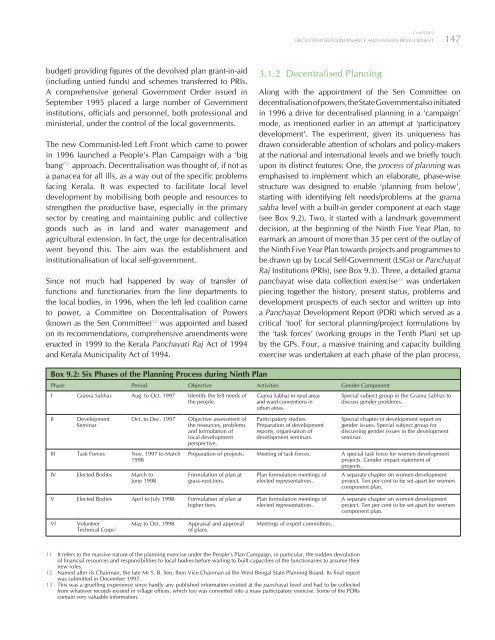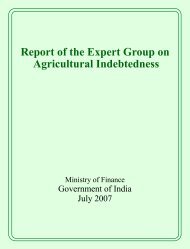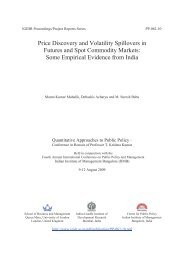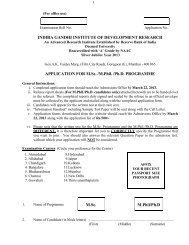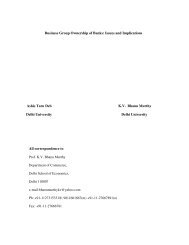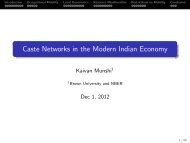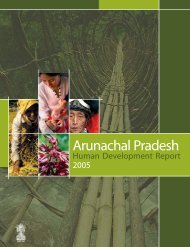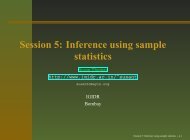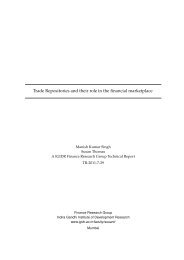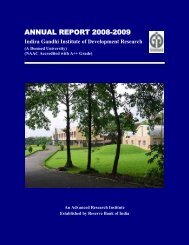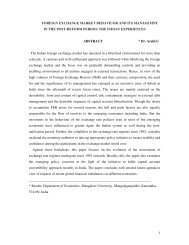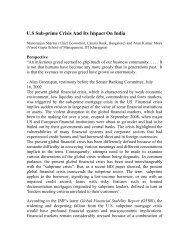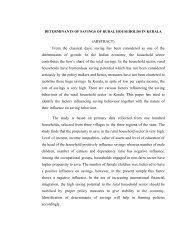Kerala 2005 - of Planning Commission
Kerala 2005 - of Planning Commission
Kerala 2005 - of Planning Commission
Create successful ePaper yourself
Turn your PDF publications into a flip-book with our unique Google optimized e-Paper software.
CHAPTER 9<br />
DECENTRALISED GOVERNANCE AND HUMAN DEVELOPMENT<br />
147<br />
budget) providing figures <strong>of</strong> the devolved plan grant-in-aid<br />
(including untied funds) and schemes transferred to PRIs.<br />
A comprehensive general Government Order issued in<br />
September 1995 placed a large number <strong>of</strong> Government<br />
institutions, <strong>of</strong>ficials and personnel, both pr<strong>of</strong>essional and<br />
ministerial, under the control <strong>of</strong> the local governments.<br />
The new Communist-led Left Front which came to power<br />
in 1996 launched a People’s Plan Campaign with a ‘big<br />
bang’ 11 approach. Decentralisation was thought <strong>of</strong>, if not as<br />
a panacea for all ills, as a way out <strong>of</strong> the specific problems<br />
facing <strong>Kerala</strong>. It was expected to facilitate local level<br />
development by mobilising both people and resources to<br />
strengthen the productive base, especially in the primary<br />
sector by creating and maintaining public and collective<br />
goods such as in land and water management and<br />
agricultural extension. In fact, the urge for decentralisation<br />
went beyond this. The aim was the establishment and<br />
institutionalisation <strong>of</strong> local self-government.<br />
Since not much had happened by way <strong>of</strong> transfer <strong>of</strong><br />
functions and functionaries from the line departments to<br />
the local bodies, in 1996, when the left led coalition came<br />
to power, a Committee on Decentralisation <strong>of</strong> Powers<br />
(known as the Sen Committee) 12 was appointed and based<br />
on its recommendations, comprehensive amendments were<br />
enacted in 1999 to the <strong>Kerala</strong> Panchayati Raj Act <strong>of</strong> 1994<br />
and <strong>Kerala</strong> Municipality Act <strong>of</strong> 1994.<br />
3.1.2 Decentralised <strong>Planning</strong><br />
Along with the appointment <strong>of</strong> the Sen Committee on<br />
decentralisation <strong>of</strong> powers, the State Government also initiated<br />
in 1996 a drive for decentralised planning in a ‘campaign’<br />
mode, as mentioned earlier in an attempt at ‘participatory<br />
development’. The experiment, given its uniqueness has<br />
drawn considerable attention <strong>of</strong> scholars and policy-makers<br />
at the national and international levels and we briefly touch<br />
upon its distinct features: One, the process <strong>of</strong> planning was<br />
emphasised to implement which an elaborate, phase-wise<br />
structure was designed to enable ‘planning from below’,<br />
starting with identifying felt needs/problems at the grama<br />
sabha level with a built-in gender component at each stage<br />
(see Box 9.2). Two, it started with a landmark government<br />
decision, at the beginning <strong>of</strong> the Ninth Five Year Plan, to<br />
earmark an amount <strong>of</strong> more than 35 per cent <strong>of</strong> the outlay <strong>of</strong><br />
the Ninth Five Year Plan towards projects and programmes to<br />
be drawn up by Local Self-Government (LSGs) or Panchayat<br />
Raj Institutions (PRIs), (see Box 9.3). Three, a detailed grama<br />
panchayat wise data collection exercise 13 was undertaken<br />
piecing together the history, present status, problems and<br />
development prospects <strong>of</strong> each sector and written up into<br />
a Panchayat Development Report (PDR) which served as a<br />
critical ‘tool’ for sectoral planning/project formulations by<br />
the ‘task forces’ (working groups in the Tenth Plan) set up<br />
by the GPs. Four, a massive training and capacity building<br />
exercise was undertaken at each phase <strong>of</strong> the plan process,<br />
Box 9.2: Six Phases <strong>of</strong> the <strong>Planning</strong> Process during Ninth Plan<br />
Phase Period Objective Activities Gender Component<br />
I Grama Sabhas Aug. to Oct. 1997 Identify the felt needs <strong>of</strong><br />
the people.<br />
Grama Sabhas in rural areas<br />
and ward conventions in<br />
urban areas.<br />
Special subject group in the Grama Sabhas to<br />
discuss gender problems.<br />
II<br />
Development<br />
Seminar<br />
Oct. to Dec. 1997<br />
III Task Forces Nov. 1997 to March<br />
1998<br />
IV Elected Bodies March to<br />
June 1998<br />
Objective assessment <strong>of</strong><br />
the resources, problems<br />
and formulation <strong>of</strong><br />
local development<br />
perspective.<br />
Participatory studies:<br />
Preparation <strong>of</strong> development<br />
reports, organisation <strong>of</strong><br />
development seminars.<br />
Special chapter in development report on<br />
gender issues. Special subject group for<br />
discussing gender issues in the development<br />
seminar.<br />
Preparation <strong>of</strong> projects. Meeting <strong>of</strong> task forces. A special task force for women development<br />
projects. Gender impact statement <strong>of</strong><br />
projects.<br />
Formulation <strong>of</strong> plan at<br />
grass-root tiers.<br />
Plan formulation meetings <strong>of</strong><br />
elected representatives.<br />
A separate chapter on women development<br />
project. Ten per cent to be set apart for women<br />
component plan.<br />
V Elected Bodies April to July 1998 Formulation <strong>of</strong> plan at<br />
higher tiers.<br />
Plan formulation meetings <strong>of</strong><br />
elected representatives.<br />
A separate chapter on women development<br />
project. Ten per cent to be set apart for women<br />
component plan.<br />
VI<br />
Volunteer<br />
May to Oct. 1998 Appraisal and approval<br />
Technical Corps 1 <strong>of</strong> plans.<br />
Meetings <strong>of</strong> expert committees.<br />
11 It refers to the massive nature <strong>of</strong> the planning exercise under the People’s Plan Campaign, in particular, the sudden devolution<br />
<strong>of</strong> financial resources and responsibilities to local bodies before waiting to built capacities <strong>of</strong> the functionaries to assume their<br />
new roles.<br />
12 Named after its Chairman, the late Mr S. B. Sen, then Vice Chairman <strong>of</strong> the West Bengal State <strong>Planning</strong> Board. Its final report<br />
was submitted in December 1997.<br />
13 This was a gruelling experience since hardly any published information existed at the panchayat level and had to be collected<br />
from whatever records existed in village <strong>of</strong>fices, which too was converted into a mass participatory exercise. Some <strong>of</strong> the PDRs<br />
contain very valuable information.


